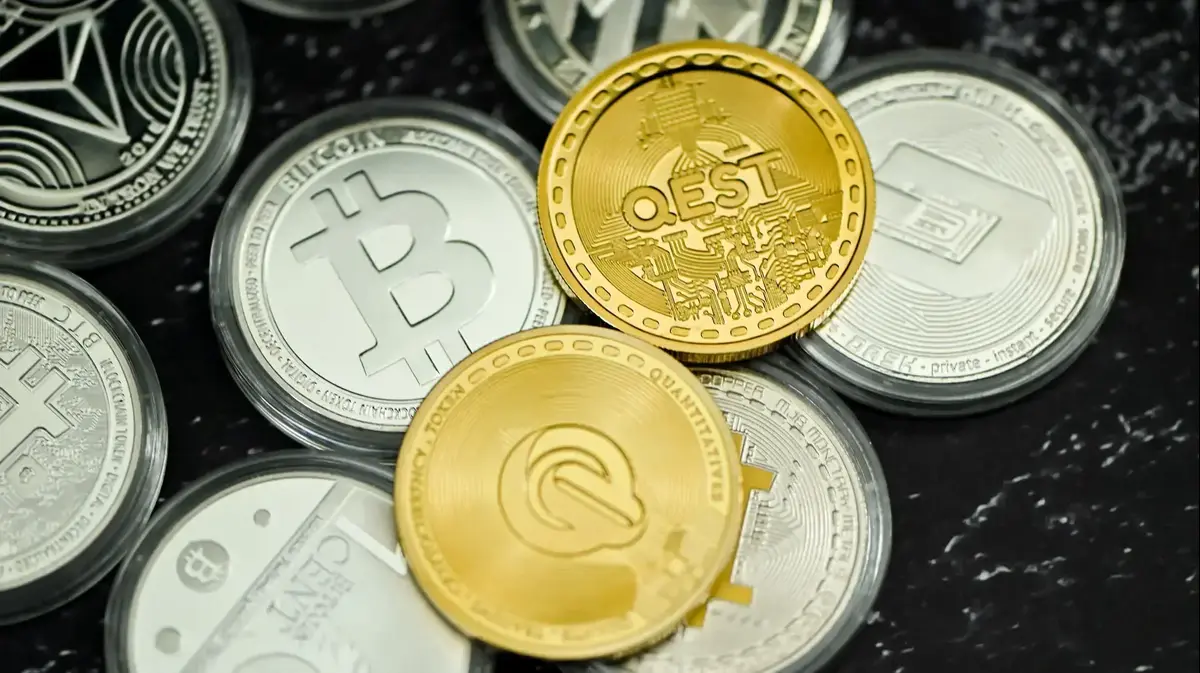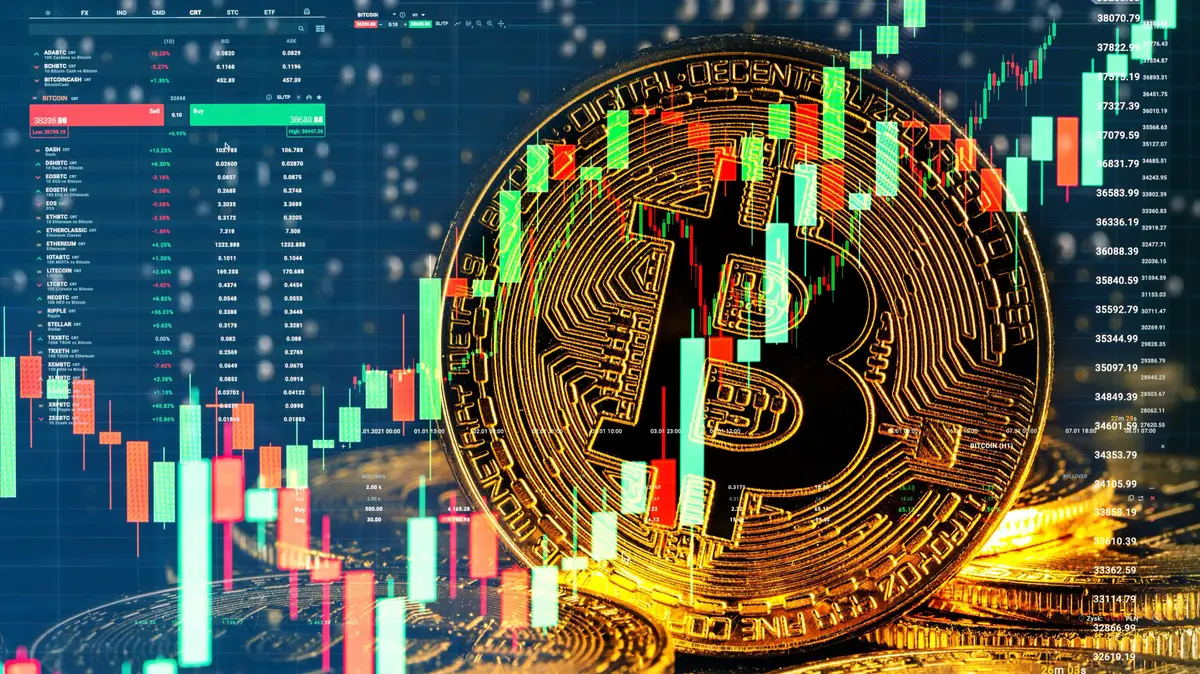Enlarge image
"There is a lot to be said for this digital, censorship-resistant, limited something": Julian Hosp
believes in Bitcoin and other cryptocurrencies
manager magazin: Mr. Hosp, inflation rates are rising in many countries, does that cause you concern with your wealth?
Julian Hosp:
I'm still a bit divided on the subject.
If you look at the last 18 months, you can see an above-average rate of inflation that Germany has not experienced on this scale for 20 years.
What matters, however, is being able to predict future inflation reasonably well.
With good diversification, an investment portfolio can be protected against inflation or deflation risks.
Do you think that cryptocurrencies like Bitcoin are suitable for protecting against inflation?
This is pure speculation.
This asset class has not been around long enough to be able to make an informed statement about it.
Therefore, we don't know whether Bitcoin is an inflation hedge or not.
I also don't think we've seen such a sharp rise in the price of Bitcoin in the past twelve months because so much money has been printed.
However, managers of gold funds are currently complaining that investors are turning to Bitcoin to protect against inflation instead of gold, as they did in the past. So are these investors going to have a rude awakening?
The volume that flows into the crypto sector is manageably small, especially compared to the established gold market.
For me, the weak performance of the precious metal gold, which is considered to be crisis-resistant, simply shows that many investors are currently not assuming long-term inflation.
As I said, we recently had above-average inflation.
However, what counts is looking ahead.
In my opinion, the forecast inflation rate still plays a subordinate role as a Bitcoin price driver.
Why do you think the price has gone up so much?
There is simply a lot to be said for this digital, censorship-resistant, limited something at the moment.
For me, these are the three decisive factors: It's digital, and society is increasingly digital.
Facebook recently made this very clear with its move to the Metaverse.
Resistance to censorship means that you cannot be forced to give something, but - and this is very interesting - you cannot be forced to hold something either.
What do you mean?
In Germany, for example, there is perhaps no concern about expropriation at the moment.
But in countries like Syria or Venezuela, people really appreciate this property of Bitcoin.
It's similar in Asian countries like Indonesia or Malaysia.
In addition, Bitcoin is demonstrably limited.
This could actually lead to the fact that, should the money supply continue to rise, the price of the 21 million Bitcoins will continue to rise sharply.
So an inflation protection after all?
"In principle, I do not see Bitcoin in competition with gold or other currencies such as dollars or euros"
Could, I say, could!
I already described such a scenario in 2015 in my book "Cryptocurrencies Simply Explained".
At the time, I predicted the price would rise to half a million dollars per bitcoin, and we're well on the way to getting there right now.
But you emphasize the word "could" yourself. With the word you can describe pretty much every conceivable scenario for the future.
It's not about possibilities, it's about probabilities.
And based on the past seven years that I have already been in this market, I see good chances that such a price development is also conceivable in the next seven years.
In any case, I basically don't see Bitcoin in competition with gold or other currencies such as dollars or euros.
This is where you differ from many crypto fans.
For me, it's just a whole new asset class.
Capital from gold or fiat currencies may be shifted into crypto currencies.
But for me, the term cryptocurrency is an unfortunate choice.
Crypto-asset might be better.
It's just completely new, something that didn't exist twelve or thirteen years ago.
I don't see that this competes with conventional money.
The idea of competition is mainly carried out into the world from the crypto community.
Yes, but I think that's irrational.
I'm not someone who approaches the topic with the almost religious zeal that many crypto fans do.
For me as an investor, it's about transferring as much value as possible into the future with as little effort as possible.
But I am not saying that Bitcoin makes everyone rich and everyone should invest all their money in Bitcoin, on the contrary.
I myself am also invested in stocks, real estate and precious metals.
What percentage of your private assets have you invested in cryptocurrencies?
I never made that public.
The reason is the crypto currencies' censorship resistance.
I don't want anyone, not even a state, to know how much crypto I have or where I keep my crypto assets.
For me this is also a piece of freedom.
It's more than 0 percent and less than 100 percent.
I recently sold over $ 10 million in crypto publicly on Youtube.
People know that this is only a small fraction of my crypto assets.
Is it more than 50 percent or less than 50 percent of your private wealth?
be silent
Let's look at the current price development for Bitcoin. Recently, there has been some boost from the first US-approved Bitcoin ETF. Is it understandable to you that this event gave the price such a boost?
First of all, this is not a spot-based ETF but a futures ETF.
That means, no Bitcoin is bought, but only a bet is made on the price.
So that in itself has no impact on the market.
But the signal effect is important: The US financial regulator SEC is open to the topic.
This increases the likelihood that a real spot-based ETF may come in 2022 or 2023.
In the end, investing is based on probabilities.
As the probabilities increase, so can the prices.
If we had such a spot-based ETF, a great many investors - funds, institutional investors - would have completely new opportunities.
You talk a lot about probabilities, it seems that there is a mathematical calculation behind it in relation to price expectations. Can you explain that?
I assume that the value of an asset is always a function of three things.
That is the use of something.
It is the number of people who see this benefit.
And it is the rarity of this benefit.
Does that mean in terms of cryptocurrencies?
There we have this digital, censorship-resistant, limited something, the use of which fluctuates.
It is also different from person to person.
A European will value Bitcoin completely differently than an African, and an Asian differently.
There are also different times.
There are times when physical goods are better than digital ones.
In the event of a power failure, for example.
People of different ages also attribute different benefits to digital things.
That means the use of Bitcoin is completely subjective.
Exactly.
The next thing - and that's the most important variable for me - is the number of people.
So how many people see this benefit from Bitcoin?
Of course, the majority of Bitcoin buyers are pure speculators who only buy because they expect prices to rise further.
But there will always be a percentage that actually sees a use in Bitcoin and not just an object of speculation.
On this basis I try to evaluate it.
With Bitcoin, however, the benefit is a virtual structure, pure imagination. It can evaporate from now on. Couldn't another of the innumerable cryptocurrencies take over Bitcoin's popularity role in the long term?
You are absolutely right, there is nothing that makes Bitcoin unique.
I am therefore broadly diversified and invested in various crypto currencies.
Which other cryptocurrencies do you prefer?
"No Bitcoin in the world would have solved the Covid crisis and its economic effects"
Bitcoin is the biggest investment for me.
My second largest is DeFiChain, a very innovative project.
The idea is that people don't buy a stock, for example, to invest in Tesla.
Instead, something is mirrored on the blockchain that behaves like the price of the Tesla share.
So investors can get into any investment without needing centralized markets.
The third largest is Ethereum, which is the second largest cryptocurrency.
Fans sometimes also believe in the usefulness of cryptocurrencies as a means of payment. El Salvador recently made headlines because Bitcoin was approved as an official means of payment there. What do you make of it?
I don't see goods in the physical world in any country that is not a third world country being priced in Bitcoin in the coming years.
That's what it's all about in the end.
What I can imagine, however, is that Bitcoin is used as a so-called settlement layer.
That means: Something costs 1000 dollars, and the buyer first changes this 1000 dollars into Bitcoin before sending it to the seller.
The latter will then exchange them back into their local currency immediately upon receipt.
For this, the Bitcoin price is completely indifferent.
I can well imagine that this will happen in many countries.
But Bitcoin is not a good means of payment.
Yes, I think that's absolutely unrealistic.
If only because the state actually needs a certain amount of control over the money.
I know this is frowned upon in the crypto world, but there are times when money needs to be printed, when the economy needs to be stimulated.
Many grumble about the huge amount of money that has been put into circulation in the past twelve months, and yes, there are negative consequences.
But no one would have wanted to face the consequences twelve months ago if the economy had not been stimulated at the time.
No Bitcoin in the world would have solved the Covid crisis and its economic effects.
Finally, the crucial question: How will the Bitcoin price continue in the coming months?
I'm not committed to that.
I'm just telling you what wouldn't surprise me.
I wouldn't be surprised to see a price range between $ 40,000 and $ 100,000 at the end of the year.
That is, the price can go up to $ 100,000, but it can also go down to $ 40,000.
However, I think a higher price than at present is more likely than a lower one.









/cloudfront-eu-central-1.images.arcpublishing.com/prisa/QLZQABDBZ5HQNGMWYSXWPVJXMY.JPG)





